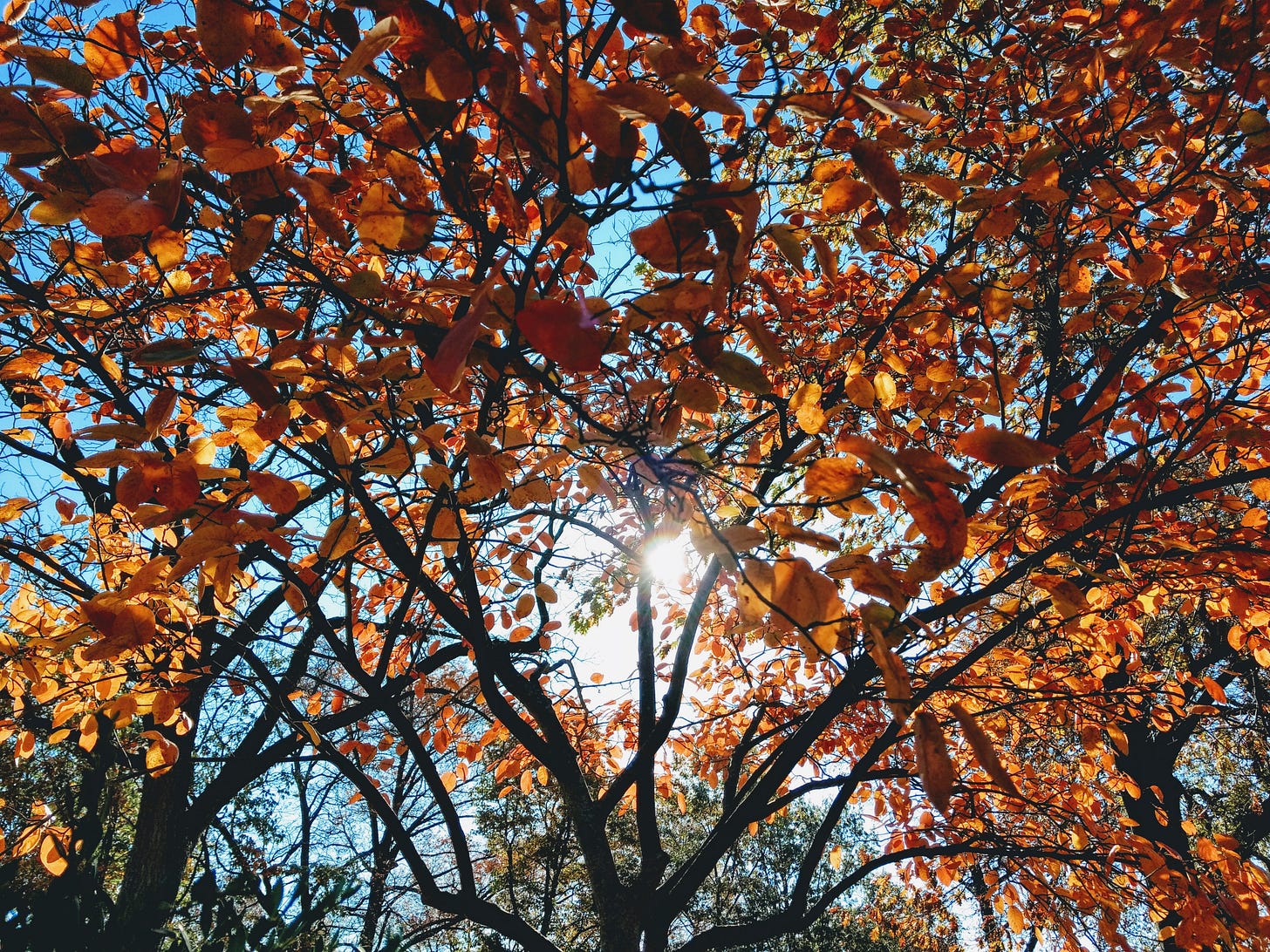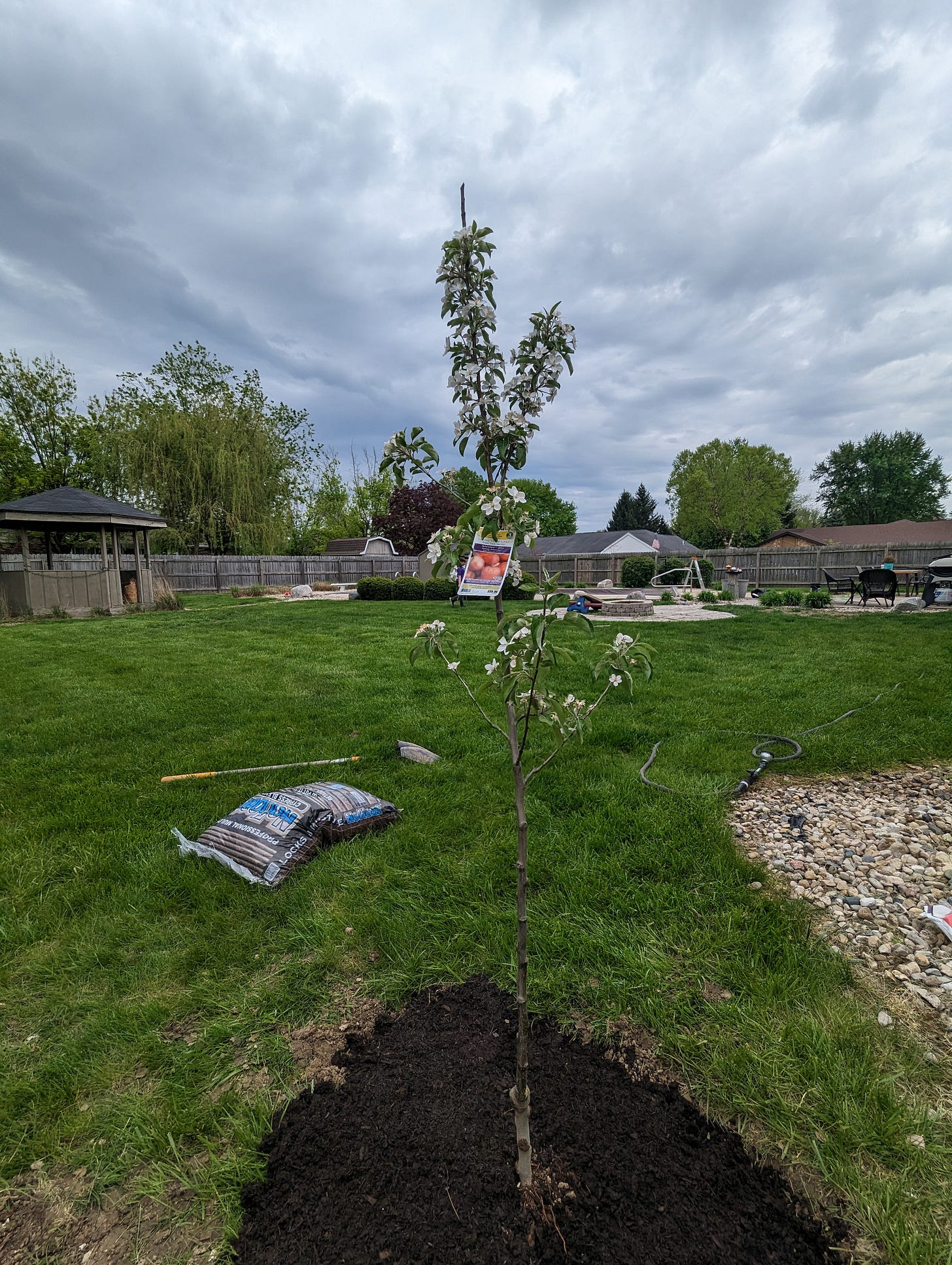Happy autumn 🍂
Anyone who knows me, even a little, knows this is my favorite time of year.
I have my fall playlist, my checklist of seasonal movies, recipes I’m dusting off, and plans to get out on some trails around the state.
This is also when most people are more aware of trees, due to their brilliant displays prior to entering dormancy for the long winter months. One last burst of color before the winter grey arrives.

And while I will certainly be captivated by and capturing (and oversharing) photos of all the foliage in the coming weeks, I’m fascinated by trees all year round.
In addition to enjoying their beauty, their shade, and their fruits, I’ve come to think of trees as a meaningful way to think about living a life.
Perhaps it’s common in your 20s and 30s, to find yourself at a place where you believe that life is really just about applying what you know to be true—the principles, the insights, the wisdom. And that if you do it right, things will be “up and to the right.” Learn the principles, apply the principles, achieve the good life.
Entering my forties—through hard experiences, panic attacks, job changes, a shifting relationship with my faith and religion, and more—the folly of that logic was laid bare. Life is not a chart, nor is it able to be distilled down into a series of inputs and outcomes.
If you look at life as a series of charts, measuring progress and growth and always wanting or expecting to go “up and to the right” — how can you end up anywhere other than exhausted and always in comparison to what else could have been? It becomes easy to start comparing myself to others, to wonder why I’m not making more progress, and to wonder if I have fallen short of my “potential.”
I’d rather think about being like a tree compared to optimizing the charts of my life.
I want to be rooted but flexible
I want to provide cover and comfort to others
I want to live in a symbiotic relationship with my environment
I want to experience seasons of fruitfulness, along with seasons of rest
I want longevity, perseverance, and resilience
Over the last year, we planted four trees—two sycamores, one tulip poplar (the state tree of Indiana), and a Honeycrisp apple tree.
Sycamore trees take 25 years to start producing a meaningful number of seeds, with their optimal seed production happening between 50-200 years of age. It’s an entirely different timescale than I’m used to considering.
In my modern life, the scale is more tuned into instant “read” statuses on text messages, two-day shipping with constant tracking, and Google searches that autocomplete my typing for me. Everything is increasingly designed around the values of urgent, immediate, and efficient.
I’m about halfway through a new book, Optimal Illusions by Coco Krumme, which I’ll likely share about more in a future dispatch. For now, I’ll share one quote as it relates to this pace of efficiency and optimization, in contrast to the perspective on life trees offer.
“The more we optimize, the more entrenched we become in the very viewpoint of optimization and the less we’re able to do, and see, things any other way.” —Coco Krumme
So I ask myself: How might I resist the temptation to make everything knowable and controllable? Can I be patient enough to wait for fruit and seeds, in the right season, to be produced in my life? How might I practice being satisfied in simply being?
And if I am trying to remain open to possibilities—to be possibilitarian—how can I stay open to “what could be” without being dependent on some future outcome? This will require more consideration.
To Check Out
In this section, you can expect to find articles, news, movies, podcasts, and more—anything I’d recommend you, well, check out.
Currently Reading:
Leaf Peeping: Discover the Seasonal Wonder of Fall Foliage
by Erin Vivid Riley
A day in the life of an oak tree (Country Life)
It really is wild (pun intended) to think about all that happens in the natural world that we either have no idea is happening or don’t slow down to notice. Maybe you’ll find a bit of wonder and delight in this read.
Be Sincere—Not Serious (Expanding Awareness)
“Why white-knuckling your way through life doesn't work.” I appreciated this read on a mindset and approach that serves you well without sucking the life out of everything as you do it.
Elementary Classroom Views of Nature Are Associated with Lower Child Externalizing Behavior Problems (Michigan State University)
“Our findings suggest that it could be really beneficial for schools to consider what the views are from classroom windows and ensure that trees are included within those views.”
Why note-taking apps don’t make us smarter (The Verge)
I recently made a move from Evernote to Notion, for writing and notetaking and gathering quotes and anecdotes. It will be interesting to see how AI does/doesn’t impact the usefulness of digital notetaking and how it impacts us. Speaking of AI’s impacts on us…
The ChatGPT Effect: How Will Our Skillset Evolve in the Age of AI? (Behavioural Economics)
I think about this every single day (but not the Roman Empire). “If we stop practicing and don’t improve our learning skills as we assume the solution is a chat message away, what would happen when we’re disconnected? Real-world problems don’t always occur when our phones are at hand.”
The Hidden Life of Trees: What They Feel, How They Communicate--Discoveries from a Secret Worlds by Peter Wohlleben
A fascinating, curious, and (at times) dense exploration of all that trees are and do.
Field Trip – Everglades National Park (The Washington Post, podcast)
The third episode of the WaPost limited series podcast about the U.S. National Parks was likely my favorite. I recommend them all, but if you only pick one, go with “Everglades.”
Smog Cloud Silver Lining (Radiolab, podcast)
My favorite podcast (Radiolab) hangs out with my favorite YouTuber (Hank Green), talking about climate change and the accidental geoengineering experiment we didn’t know we were doing. And when we tried to make things better, they actually got worse by doing good.
So Many Steves: Afternoons with Steve Martins (Pushkin, audiobook)
Pushkin (Malcolm Gladwell’s production company) has started creating audiobook releases. Some, though, could qualify as long-form podcasts, including this one (at 2.5 hours). I really enjoyed it, learning more about Steve Marin and getting some fresh laughs Rather than pay for it ($14.95), I checked it out through Libby and my local library. Take that route if you’re interested.
This dispatch was written to music, including a playlist created to capture the setlist from a recent bucket list Nickel Creek concern I saw in early September.







